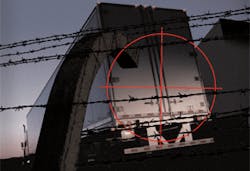The Dept. of Homeland Security (DHS) recently announced plans to install radiation-detection devices at points of entry into major cities to vet containers and trucks for dirty bombs. It will use New York City as a staging area for pilot tests.
The multi-layered initiative to protect the U.S. from a terrorist attack using nuclear or radiological weapons will not only screen nearly 100% of containers entering the country by next year, but also screen commercial traffic entering major cities, regardless of whether the freight crossed international borders, DHS said.
“[The Securing the Cities Initiative]…is a program to see how to deploy this kind of detection equipment, not only at seaports and ports of entry by land, but in cities and around cities, so we could detect a truck coming into a city with a dirty bomb, even if it didn’t cross an international border,” said DHS Secretary Michael Chertoff.
“We are currently working with the City of New York, with the police department and [the Domestic Nuclear Detection Office of DHS], to begin the process of planning and deploying a pilot of this Securing the Cities system of internal radiation-detection equipment, so we can move to this comprehensive coverage of protection against nuclear threats,” he continued. “That, I think, is one of the highest priorities for this Department and for this administration.”
DHS has not elaborated on how the Securing the Cities Initiative will look once it’s finalized, but said it is still considering “ways in which [DHS] could best capture a detection of radioactive material coming in” without disrupting traffic flow using both stationary and mobile equipment.
The pilot began in “the last few months” and its timetable is “being worked on,” DHS said.
The initiative followed DHS’s announcement it has awarded contracts totaling $1.157 billion to develop next-generation radiation portal monitors that more accurately identify potential threats and reduce false alarms. Current-generation monitors set off alarms when they detect harmless, naturally radioactive materials such as granite and kitty litter, DHS indicated.
“One of the problems we have is the rate of false positives,” Chertoff said. “We’ve begun to order the first 80 of what will be 1,400 of these advanced detection equipment immediately.”
Starting in autumn DHS will “begin the deployment in the New York-New Jersey area seaport area. And we’re then going to roll it out in a number of different seaports and land-ports across the country,” Chertoff added.
By the end of the year, DHS aims to have close to 90% of all containers entering the U.S. by land or sea checked, with close to 100% by next year.
For more information, go to www.dhs.gov/dhspublic/interapp/press_release/press_release_0952.xml
To comment on the article, write to Terrence Nguyen at [email protected]